What We Believe
What is distinctive about Methodism?
The Methodist Church is a mainstream Christian Church. It works in partnership with other denominations, But there are certain emphases in the Methodist culture which make it distinctive.
All Can Be Saved.

All need to be saved.
All may be saved.
All may know themselves saved.
All may be saved to the uttermost.
Methodists have always been clear that no-one is beyond the reach of God's love. Salvation is there for everyone who turns to God, and not just for a chosen few.
Why do we need salvation?
As human beings we find ourselves part of an unjust, sinful and violent world, which we may feel individually helpless to change.
We may feel driven by urges such as anger, lust or greed, that we wish did not control us.
We may have personalities which are difficult to manage, for instance being prone to despair.
We may be enduring poverty and hardship.
The demands of modern life leave many of us stressed and overloaded, or isolated and feeling useless. Loss, fear, grief or guilt may be weighing us down. We need salvation.
What do Christians believe?
Jesus preached the Gospel - the good news of the Kingdom of God. Through Jesus' death on the cross, and his resurrection, Christians believe that God has broken the power of all that is evil, in the world and in ourselves. If we accept forgiveness and liberation, and are willing to be open to the Holy Spirit, God can enable us to resist evil and to live life to the full.
All may be saved.
All may know themselves saved.
All may be saved to the uttermost.
Methodists have always been clear that no-one is beyond the reach of God's love. Salvation is there for everyone who turns to God, and not just for a chosen few.
Why do we need salvation?
As human beings we find ourselves part of an unjust, sinful and violent world, which we may feel individually helpless to change.
We may feel driven by urges such as anger, lust or greed, that we wish did not control us.
We may have personalities which are difficult to manage, for instance being prone to despair.
We may be enduring poverty and hardship.
The demands of modern life leave many of us stressed and overloaded, or isolated and feeling useless. Loss, fear, grief or guilt may be weighing us down. We need salvation.
What do Christians believe?
Jesus preached the Gospel - the good news of the Kingdom of God. Through Jesus' death on the cross, and his resurrection, Christians believe that God has broken the power of all that is evil, in the world and in ourselves. If we accept forgiveness and liberation, and are willing to be open to the Holy Spirit, God can enable us to resist evil and to live life to the full.
Assurance of God's love.
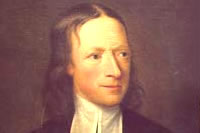
If we have mixed feelings about faith, or are unsure whether we are feeling the right things, or unable to get away from feelings of guilt, it helps to know that we are not alone.
John Wesley wrestled with difficult feelings on his journey of faith. Although already an ordained minister in the Church of England, he did not feel he was truly loved and forgiven by God until the famous moment described in his journal for 24 May 1738:
In the evening I went very unwillingly to a society at Aldersgate Street, where one was reading from Luther's preface to the Epistle to the Romans.
About a quarter before nine, while he was describing the change that God works in the heart through faith in Christ, I felt my heart strangely warmed.
I felt I did trust in Christ, Christ alone, for salvation. And an assurance was given me that he had taken away my sins, even mine, and saved me from the law of sin and death.
John Wesley did not give up on his search - he actually did go and listen, even if very unwillingly. He put himself in the right place, and found that God gave him freely the sense of joy and assurance he was looking for.
Our faith rests not on our own feelings, but on the promises of a faithful God.
John Wesley wrestled with difficult feelings on his journey of faith. Although already an ordained minister in the Church of England, he did not feel he was truly loved and forgiven by God until the famous moment described in his journal for 24 May 1738:
In the evening I went very unwillingly to a society at Aldersgate Street, where one was reading from Luther's preface to the Epistle to the Romans.
About a quarter before nine, while he was describing the change that God works in the heart through faith in Christ, I felt my heart strangely warmed.
I felt I did trust in Christ, Christ alone, for salvation. And an assurance was given me that he had taken away my sins, even mine, and saved me from the law of sin and death.
John Wesley did not give up on his search - he actually did go and listen, even if very unwillingly. He put himself in the right place, and found that God gave him freely the sense of joy and assurance he was looking for.
Our faith rests not on our own feelings, but on the promises of a faithful God.
Living a holy life.
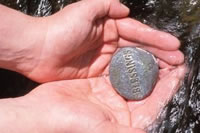
The longing for holiness is not about wanting to be 'holier than thou'. It is about wanting the love of God to permeate all of our life, and for that love to be shown through our lives to other people.
God gives us the Holy Spirit, and when we respond, there is no limit to what the grace of God is able to do in a human life. John Wesley taught about 'Christian perfection.' He believed that a mature Christian can reach a state where the love of God reigns supreme in our heart. We can't be perfect in an absolute way, as God is. But we can be made perfect in love.
However we do not become holy all on our own. Methodists believe in what John Wesley called 'social holiness'. It is vital to meet and worship with other Christians in order to grow in the Christian life and to understand what is God's will for us and for our community.
The Methodist movement began in the eighteenth century when John and Charles Wesley got together with like-minded friends in Oxford to meet regularly for prayer, Bible study and Holy Communion, and to visit prisons and workhouses. It was called the Holy Club.
Holiness is not just about personal spirituality and prayer. It will also be expressed through a commitment to social justice and to enabling other people to become followers of Jesus.
God gives us the Holy Spirit, and when we respond, there is no limit to what the grace of God is able to do in a human life. John Wesley taught about 'Christian perfection.' He believed that a mature Christian can reach a state where the love of God reigns supreme in our heart. We can't be perfect in an absolute way, as God is. But we can be made perfect in love.
However we do not become holy all on our own. Methodists believe in what John Wesley called 'social holiness'. It is vital to meet and worship with other Christians in order to grow in the Christian life and to understand what is God's will for us and for our community.
The Methodist movement began in the eighteenth century when John and Charles Wesley got together with like-minded friends in Oxford to meet regularly for prayer, Bible study and Holy Communion, and to visit prisons and workhouses. It was called the Holy Club.
Holiness is not just about personal spirituality and prayer. It will also be expressed through a commitment to social justice and to enabling other people to become followers of Jesus.
A grassroots movement.

It is a strong feature of Methodism that ordinary lay people play a major part in the running of the Church. A recent survey of Methodist congregations revealed that three out of four individuals who responded held some sort of church role.
Local lay people called 'stewards' take responsibility for the fabric of church buildings and manses and for the handling of money. They share with ordained ministers the role of setting direction for the churches in a particular area or 'circuit'.
Worship each week is not always led by an ordained minister, but often by a local preacher - a lay person who has been trained and authorized to lead worship and preach. Every ordained minister in the Methodist Church is first a local preacher.
At all levels of the Methodist Church, lay people are involved in decision making, and the vice-president of the Conference is always a lay person.
This emphasis goes back to the roots of Methodism. John Wesley was very much a folk theologian who wanted to speak 'plain truth to plain people'. He took seriously the working people of his day. He addressed his preaching to them, and drew great crowds in the street or on hillsides.
He also trusted them with responsibilities. In building the local Methodist groups or 'societies', he trained many lay people who then maintained the meetings and gave pastoral care and challenge to the members. He also trained preachers, who led worship locally, rather than travelling the country like himself.
Local lay people called 'stewards' take responsibility for the fabric of church buildings and manses and for the handling of money. They share with ordained ministers the role of setting direction for the churches in a particular area or 'circuit'.
Worship each week is not always led by an ordained minister, but often by a local preacher - a lay person who has been trained and authorized to lead worship and preach. Every ordained minister in the Methodist Church is first a local preacher.
At all levels of the Methodist Church, lay people are involved in decision making, and the vice-president of the Conference is always a lay person.
This emphasis goes back to the roots of Methodism. John Wesley was very much a folk theologian who wanted to speak 'plain truth to plain people'. He took seriously the working people of his day. He addressed his preaching to them, and drew great crowds in the street or on hillsides.
He also trusted them with responsibilities. In building the local Methodist groups or 'societies', he trained many lay people who then maintained the meetings and gave pastoral care and challenge to the members. He also trained preachers, who led worship locally, rather than travelling the country like himself.
Reading the Bible.
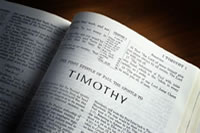
Christians need to be familiar with the Bible and to immerse themselves in it. The books of the Old and New Testaments contain a wide variety of literature, including history, law, poetry, gospels, letters, polemic, stories and apocalyptic visions.
The texts were written and gathered together over a long period of time, and it is important to find out as much as we can about the original contexts in which texts were produced.
At the same time, Christians read the Bible as part of a faith community, and read the Bible to put ourselves into the story of God's dealings with humanity. The Bible can be puzzling but it is continually a source of inspiration and direction in our lives.
The texts were written and gathered together over a long period of time, and it is important to find out as much as we can about the original contexts in which texts were produced.
At the same time, Christians read the Bible as part of a faith community, and read the Bible to put ourselves into the story of God's dealings with humanity. The Bible can be puzzling but it is continually a source of inspiration and direction in our lives.
|
A Catechism for the people called Methodists, Question 52: '"The Bible is the record of God's self revelation, supremely in Jesus Christ , and is a means through which he still reveals himself, by the Holy Spirit.'"
A Catechism for the people called Methodists, Question 52: "It is good for Christians with differing approaches to the interpretation of the Bible to engage with each other and argue through how the Bible should be applied to issues in our contemporary world." |
|
The 'Methodist quadrilateral'.
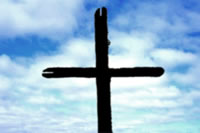
Methodists traditionally use a fourfold approach to learn about our Christian faith and apply it to contemporary issues and to our Christian practice:-
Scripture
We seek to discover the word of God through reading the Bible. There are different understandings among Methodists about the Bible's authority in our lives. We need to use resources like different Bible translations, commentaries and Bible reading notes.
Tradition
This is the wisdom and creativity of Christians over time and across the world. It includes inspirational material like hymns, songs, prayers, poetry, Christian art and devotional books,. There are also formally agreed teachings like the creeds, the content of the catechism, and statements and reports from the Methodist Conference.
Reason
We are called to love God with our minds as well as with our hearts. To the best of our ability we need to think things through in the light of reason. This means becoming aware of different points of view, and using our own critical thinking to make sense of God's world.
Experience
Methodism particularly stresses the importance of our own experience of God's grace working in our lives. We gain wisdom and maturity from life experience, especially when we pray and reflect about our story with other Christians.
Scripture
We seek to discover the word of God through reading the Bible. There are different understandings among Methodists about the Bible's authority in our lives. We need to use resources like different Bible translations, commentaries and Bible reading notes.
Tradition
This is the wisdom and creativity of Christians over time and across the world. It includes inspirational material like hymns, songs, prayers, poetry, Christian art and devotional books,. There are also formally agreed teachings like the creeds, the content of the catechism, and statements and reports from the Methodist Conference.
Reason
We are called to love God with our minds as well as with our hearts. To the best of our ability we need to think things through in the light of reason. This means becoming aware of different points of view, and using our own critical thinking to make sense of God's world.
Experience
Methodism particularly stresses the importance of our own experience of God's grace working in our lives. We gain wisdom and maturity from life experience, especially when we pray and reflect about our story with other Christians.
Born in song.
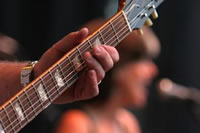
Methodists are well known as enthusiastic singers, in choirs and congregations. Singing is still an important means of learning about, sharing and celebrating our faith.
The official hymnbook of the Methodist Church is currently Hymns & Psalms but worship in Methodist churches typically includes music from a wide range of sources, including contemporary songs. The Methodist Church recently published a modern collection of worship music in a volume called Singing the Faith.
The annual Methodist Conference always opens and closes with traditional hymns. Many visitors are inspired by the power of a large gathering singing unaccompanied in harmony.
John and Charles Wesley first realised the power of singing to strengthen faith when they were travelling across the Atlantic to Georgia in May 1735. There was a terrible storm at sea, but a group of German Moravian Christians inspired the brothers with their confidence in God. They preached and sang hymns together and the Wesley brothers realised their own faith was much weaker.
Three years later, back in London, both John and Charles experienced a kind of conversion in which they felt a deep assurance that they personally had received salvation .
Charles wrote in all about 6,000 hymns, and many of them are still sung today, not only by Methodists, but by Christians across the world.
The official hymnbook of the Methodist Church is currently Hymns & Psalms but worship in Methodist churches typically includes music from a wide range of sources, including contemporary songs. The Methodist Church recently published a modern collection of worship music in a volume called Singing the Faith.
The annual Methodist Conference always opens and closes with traditional hymns. Many visitors are inspired by the power of a large gathering singing unaccompanied in harmony.
John and Charles Wesley first realised the power of singing to strengthen faith when they were travelling across the Atlantic to Georgia in May 1735. There was a terrible storm at sea, but a group of German Moravian Christians inspired the brothers with their confidence in God. They preached and sang hymns together and the Wesley brothers realised their own faith was much weaker.
Three years later, back in London, both John and Charles experienced a kind of conversion in which they felt a deep assurance that they personally had received salvation .
Charles wrote in all about 6,000 hymns, and many of them are still sung today, not only by Methodists, but by Christians across the world.
Much of what makes Methodism unique stems from its founders, the brothers John and Charles Wesley. J. C. Ryle, the Nineteenth Century academic and first Anglican Bishop of Liverpool, wrote a history of John Wesley. Whilst interpretations of Wesley's ministry change over time, extracts of Ryle's biography can be heard on YouTube, as well as a dramatisation of one of his sermons, below:-
|
|
|
To find our more about The Methodist Church of Great Britain, please visit the website here.
Or, you can visit the website of the World Methodist Council here.
©2020 Frodsham Methodist Church
